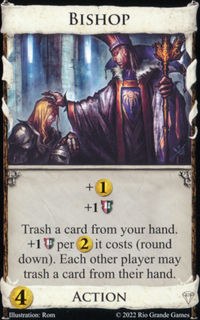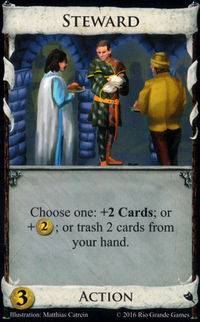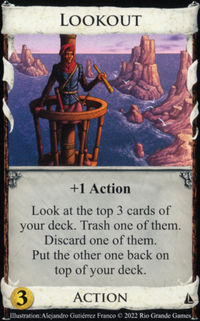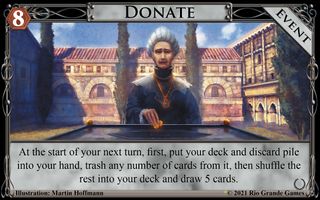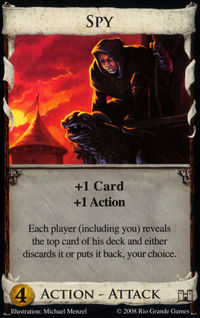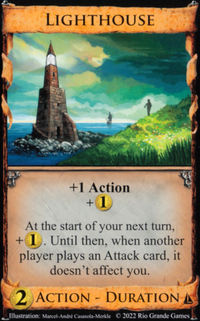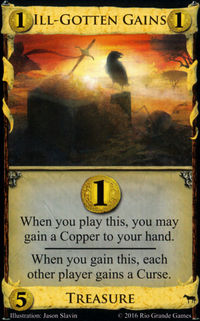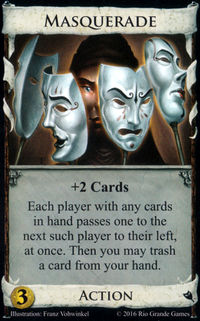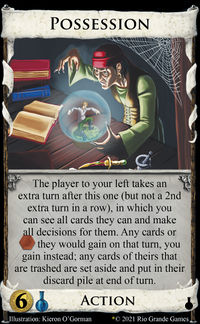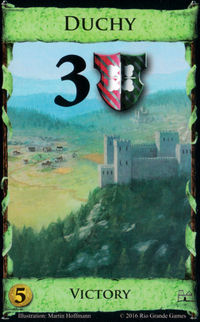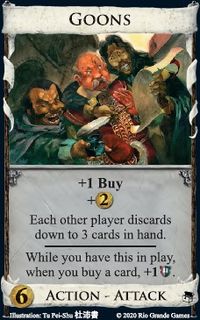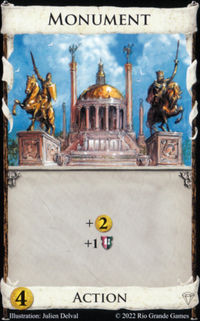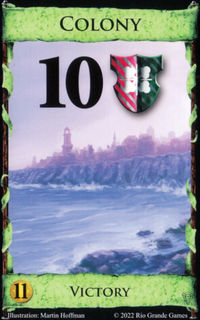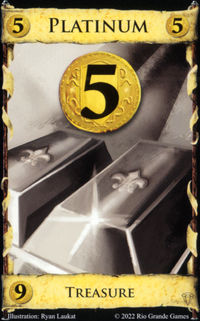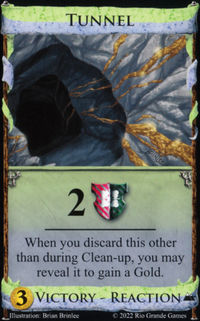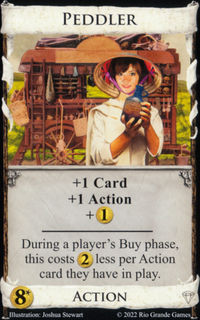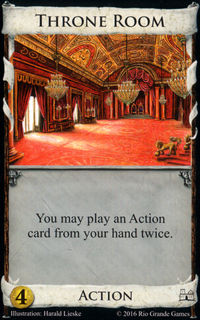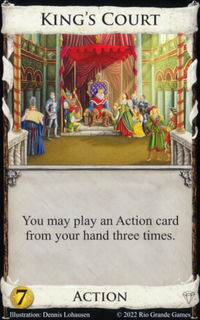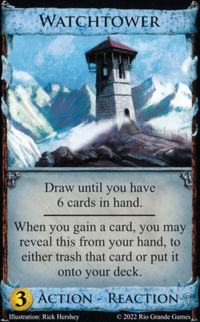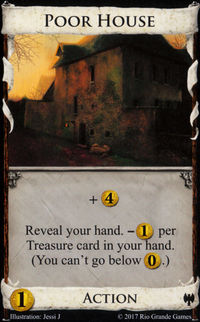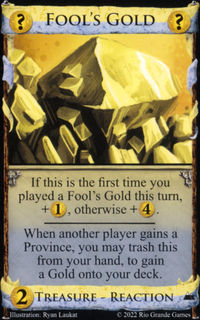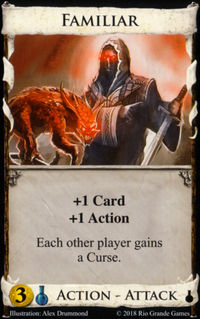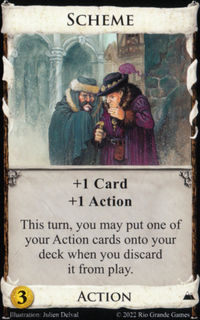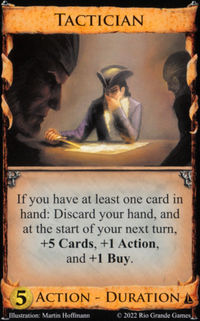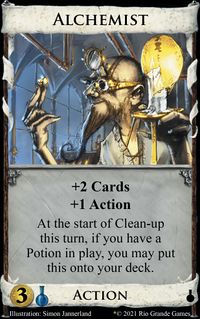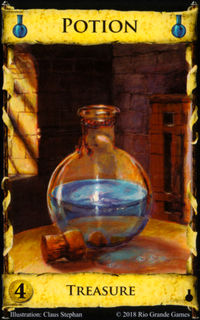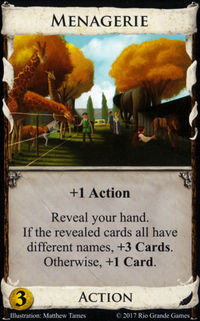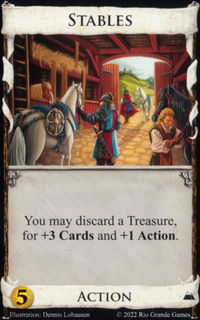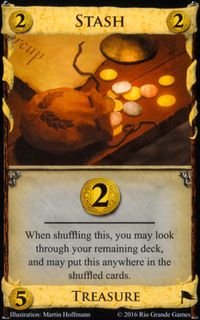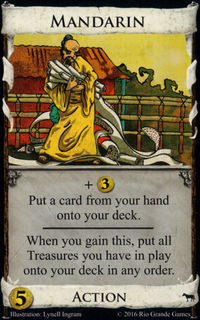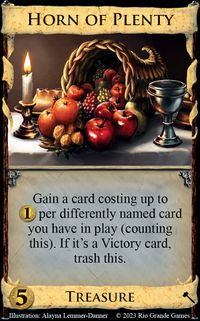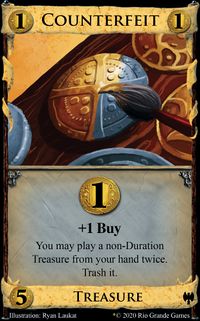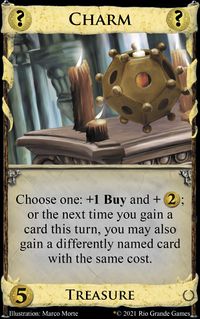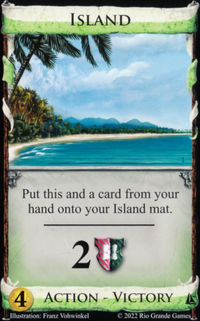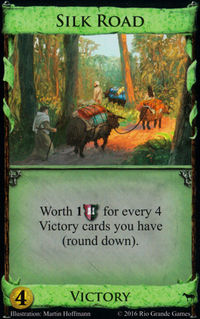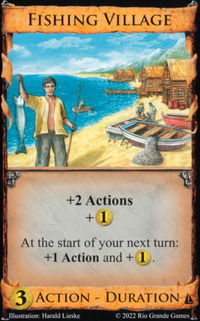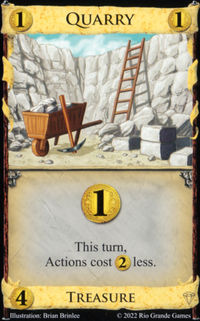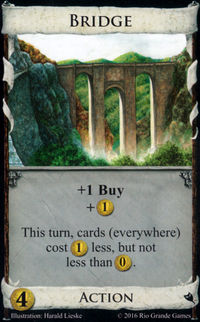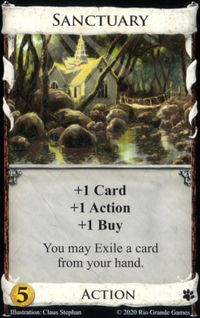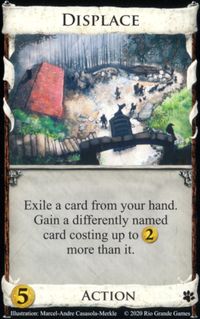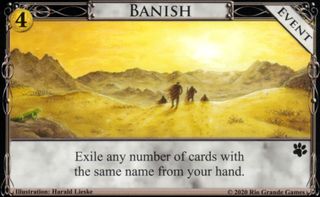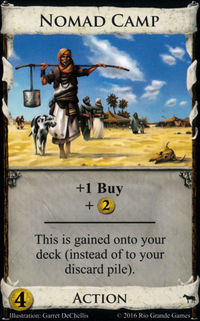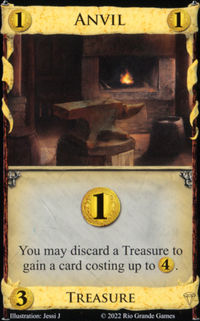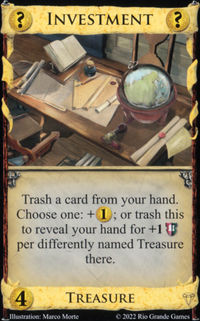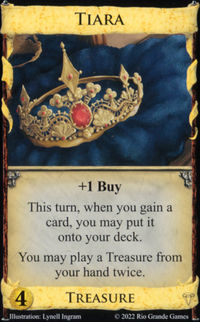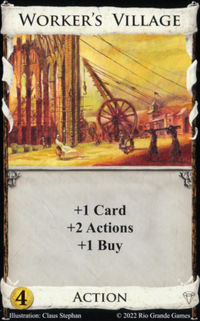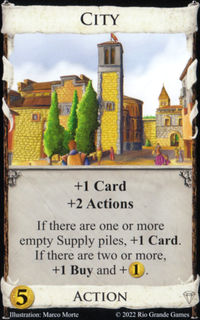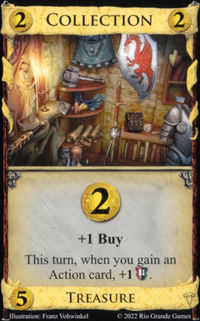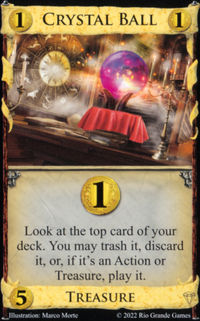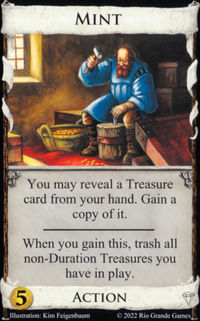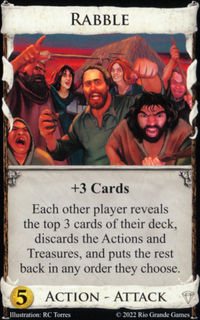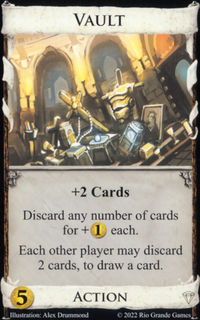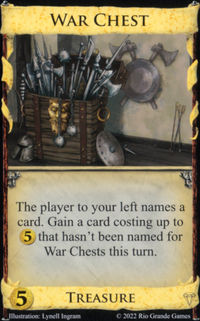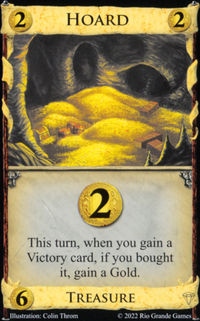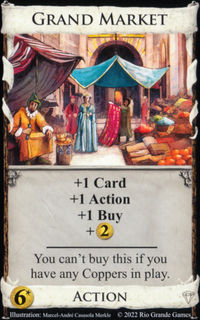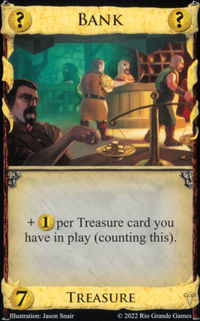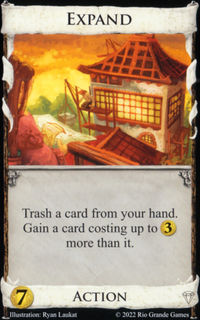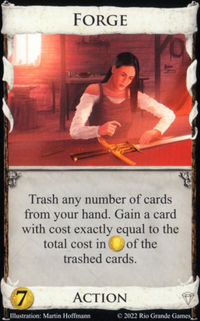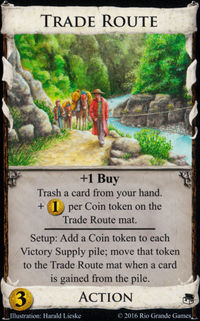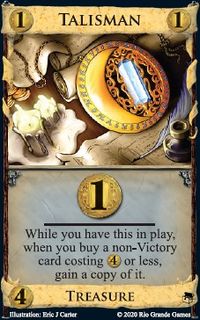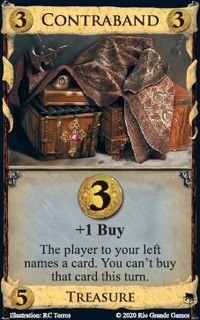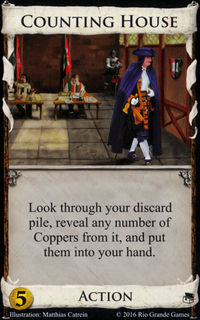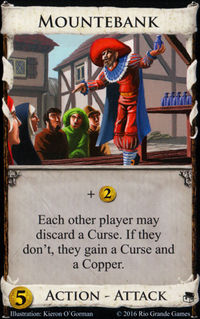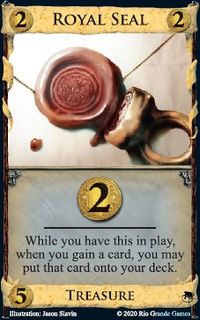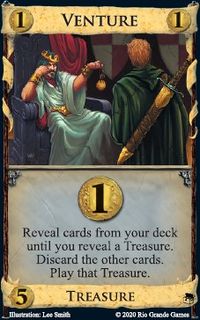Golden Deck: Difference between revisions
m Tiedy up Coin/Potion/Card-Template and internal links, lists and headlines |
Wikiwikiwiki (talk | contribs) No edit summary |
||
| (45 intermediate revisions by 29 users not shown) | |||
| Line 1: | Line 1: | ||
A '''Golden Deck''' is any deck that, every turn, gives the player the same hand and nets | {{Improve}} | ||
A '''Golden Deck''' is any deck that, every turn, gives the player the same hand and nets them +{{VP}}. Usually a Golden Deck consists of the five-card deck {{Card|Bishop}}-{{Card|Gold}}-{{Card|Silver}}(x2)-{{Card|Province}}, allowing the player to Bishop a Province for 5{{VP}} and buy another Province. | |||
== The Standard Golden Deck == | == The Standard Golden Deck == | ||
| Line 7: | Line 9: | ||
* One {{Card|Province}} | * One {{Card|Province}} | ||
Every turn, this deck can play Bishop to trash a Province for 5{{VP}}, and then use {{Cost|8}} to buy a new Province, earning VP without changing the state of your hand or deck. More generally, "a Golden Deck" is used to refer to any deck that shares that property - you are guaranteed the same draws every turn, and you earn {{VP}} without | Every turn, this deck can play Bishop to trash a Province for 5{{VP}}, and then use {{Cost|8}} to buy a new Province, earning VP without changing the state of your hand or deck. More generally, "a Golden Deck" is used to refer to any deck that shares that property - you are guaranteed the same draws every turn, and you earn {{VP}} without changing the composition of your deck. | ||
== Setting it up == | == Setting it up == | ||
* The standard setup for a Golden Deck requires [[opening]] with {{Card|Bishop}}/{{Card|Chapel}}. Opening {{Card|Steward}}/Steward is also possible, though significantly slower. | * The standard setup for a Golden Deck requires [[opening]] with {{Card|Bishop}}/{{Card|Chapel}}. Opening {{Card|Steward}}/Steward or {{Card|Lookout}}/Bishop is also possible, though significantly slower. | ||
* Your aim is to [[trash]] your starting cards as fast as possible; almost always err on the side of trashing faster rather than buying, unless you would go below {{Cost|3}} total in your whole deck. | * Your aim is to [[trash]] your starting cards as fast as possible; almost always err on the side of trashing faster rather than buying, unless you would go below {{Cost|3}} total in your whole deck. When your starting cards are gone (or perhaps one card before that), you should end up drawing the Bishop and Chapel together, and use the Bishop to get rid of the now useless Chapel. | ||
* You should not need to buy more than two {{Card|Silver|Silvers}}. Buying one {{Card|Gold}} will be easy once your deck gets down to 5 cards. | * You should not need to buy more than two {{Card|Silver|Silvers}}. Buying one {{Card|Gold}} will be easy once your deck gets down to 5 cards. | ||
* Drawing your Chapel on turn 5 will seriously mess you up. There's not much you can do about that. | * Drawing your Chapel on turn 5 will seriously mess you up. There's not much you can do about that. | ||
* Once the deck is set up, trash Province every turn and buy Province, until the game is over. | * Once the deck is set up, trash Province every turn and buy Province, until the game is over. | ||
* If | * Sometimes you will find it natural to get two Golds and one Silver, rather than the other way around. In this case you will not need to trash when you buy the last Province, which is 1{{VP}} better for you. | ||
* If the [[Penultimate Province Rule]] is a concern, you can instead switch to buying and trashing Gold for 4{{VP}} per turn instead of 5{{VP}} for trashing Provinces. (This gives you a significant advantage over a player who is [[duchy dancing]], since you are getting more {{VP}} per turn and also not clogging your deck.) If you have one Gold, you might also trash Silver and buy Gold, anticipating a Province buy without trashing as described above. | |||
* The {{Event|Donate}} event from [[Empires]] allows a faster setup with no (further) shuffle luck, especially on anything but a 2/5 opening. For 5/2, Donate turn 1 and keep 3 Coppers; repay on turn 2; buy Silver on turn 3 and Bishop on turn 4, then proceed normally. For 4/3, Donate turn 1 and keep ''4'' Coppers, repay on turn 2, buy the Bishop on turn 3, and replace a Copper with Silver on turn 4. For 3/4, buy Silver on turn 1; Donate on turn 2, keeping the Silver and 2 Coppers; repay on turn 3; buy Bishop on turn 4. Either way, you begin trashing Provinces on turn 8. On 2/5, keep 3 Coppers; it will unavoidably take an extra turn to repay the Debt, but after that it works the same way. (With perfect shuffle luck, Bishop/Chapel starts trashing Provinces on turn 9 - though this also requires careful play, deliberately not trashing one of the Coppers when there is an opportunity to do so.) | |||
== Strategy == | == Strategy == | ||
* The Golden Deck is weak against many [[Attack]] | * The Golden Deck is weak against many [[Attack|Attacks]]. | ||
** [[Curser]] | ** [[Curser|Cursers]] and other [[junking attack|junking attacks]] can cause you to have a 6-card deck instead of a 5-card deck, thus breaking your combo; you will be forced to spend turns trashing incoming junk and not buying/trashing Provinces. | ||
** [[Handsize attack|Discard attack]]s will leave you with a 3-card hand. | ** [[Bureaucrat]] can mess up your strategy once you have your Golden Deck, because it will topdeck your Province, leaving you with the unpleasant choice of either buying a second province, getting a 6-card deck; or waiting a turn and not earning anything. | ||
** However, once the Golden Deck gets going, it is immune to [[trashing attack]] | ** [[Handsize attack|Discard attack]]s will leave you with a 3-card hand. (Once the deck is set up, unless you want to risk "breaking" it, the best you can really do here is to trash and replace a Silver - so you only get 2{{VP}} that turn. Or if you have a 2-Gold setup, you can "downgrade" to a 1-Gold setup, claiming 4{{VP}} this turn.) | ||
* The Golden Deck is weak against [[engine]] | ** However, once the Golden Deck gets going, it is immune to [[trashing attack|trashing attacks]] and {{Card|Spy}}-type Attacks, because your entire deck is in your hand; there's no deck for the Attacks to target. | ||
* {{Card|Colony}} games do not favor a Golden Deck, since | ** If there is {{Card|Lighthouse}} in the supply you can exchange Silver for Lighthouses for an Attack-resilient Golden Deck. You want to get exactly two Lighthouses, playing one each turn (with the other out as a Duration from the previous turn). Keep in mind that {{Card|Ill-Gotten Gains}} and {{Card|Masquerade}} still hurt you. You can also still be {{Card|Possession|Possessed}} (in this case, stick with one Gold; then your opponent can't claim a Province from your deck without giving you the Bishop VP as well). | ||
* The Golden Deck is weak against strong [[engine|engines]] that don't stall. 5{{VP}} per turn isn't actually that many; it will beat strategies that stall after picking up a few Provinces, but engines that can continue to pick up Provinces without stalling and can detour for {{Card|Duchy|Duchies}} (or which can pick up a lot of VP in other ways, e.g. massive {{Card|Goons}} or {{Card|Monument}} engines) will be able to overtake a Golden Deck. This is especially true since the opponent will have the benefit of a lot of Bishop trashing early. | |||
* {{Card|Colony}} games do not favor a Golden Deck, since Colonies are effectively worth only 1 more {{VP}} than Provinces to you (since you are trashing them for 6{{VP}} instead of 5) but 4 more to your opponent (who is keeping them in deck for their face value). Given its overall power, however, the Golden Deck is still often strong in such games, in either Colony OR Province form, depending on your opponent's strategy. | |||
* If behind with a golden deck (or in a close game against an opponent who is likely to stall), the deck can continue to get slightly fewer points almost indefinitely by trashing and buying other expensive cards (not just Province and Colony), typically {{Card|Gold}} (or {{Card|Platinum}} in a Colony game) | |||
== Variants == | == Variants == | ||
| Line 29: | Line 36: | ||
* Decks which gain Gold cards with {{Card|Tunnel}} and then trash them for {{VP}} | * Decks which gain Gold cards with {{Card|Tunnel}} and then trash them for {{VP}} | ||
* {{Card|Colony}} Golden Decks such as {{Card|Platinum}}, Platinum, Bishop, Colony, Colony | * {{Card|Colony}} Golden Decks such as {{Card|Platinum}}, Platinum, Bishop, Colony, Colony | ||
* {{Card|Peddler}} instead of Province also gives 5{{VP}}, but is cheaper to buy | |||
* [[Combo: Bishop and Fortress]] | * [[Combo: Bishop and Fortress]] | ||
* 5-card decks with {{Card|Monument|Monuments}}, potentially with {{Card|Throne Room}} or {{Card|King's Court}} to maximize points. | * 5-card decks with {{Card|Monument|Monuments}}, potentially with {{Card|Throne Room}} or {{Card|King's Court}} to maximize points. | ||
* 5-card decks with {{Card|Goons}} and {{Card|Watchtower}} score points by buying cheap cards, and maintain the 5-card deck by trashing the incoming buys. | * 5-card decks with {{Card|Goons}} and {{Card|Watchtower}} score points by buying cheap cards, and maintain the 5-card deck by trashing the incoming buys. | ||
* 4-card decks with 2x {{Card|Poor House}}, {{Card|Bishop}} and any +actions. | |||
*Three {{card| Fool's Gold}} and a {{card| Bishop}}. With this, you can buy a province each turn and trash it the next repeating the cycle like a normal Golden Deck | |||
=== Beyond 5-card setups === | |||
There are a few ways to build a larger deck so that it is guaranteed to draw itself and score points without your deck composition changing. | |||
* [[Cantrip|Cantrips]] can be mixed in to this strategy more or less freely, although there needs to be a good reason to pick them up or else they are just a distraction. On a board with light trashing and {{Card|Familiar}}, for example (such that going straight for the Golden Deck will be much too slow), you might start out attacking with Familiar and transition into a Golden Deck later; there is no need in this case to remove the Familiars with your Bishop. | |||
* {{Card|King's Court|King's Court}}/{{Card|Scheme|Scheme}} combos can come into play here as well; each turn you top-deck KC-KC-Scheme-X-X (or similar) in such a way that you're guaranteed to draw the rest of your deck (although if the pieces are in place to do this, you quite likely have even better options!) | |||
* Two {{Card|Tactician|Tacticians}} may allow you to play an 11-card Golden Deck, inspired by the basic [[Double Tactician]] engine idea. Each turn you trash one or more cards, generate virtual coin in whatever way, and then buy replacements. This especially works well with the {{Card|Tunnel}} variant, since you will be discarding your hand to Tactician anyway, which takes care of enabling the Gold gain from Tunnel. | |||
* {{Card|Alchemist}} stacks work great for this as well (this especially helps out with the Goons/Watchtower variant, since you will only be able to play at most 3 Goons with a "basic" 5-card Golden Deck). You only need one {{Card|Potion}} in the "steady state"; just make sure that at least 1/3 of your deck is Alchemists. | |||
* {{Card|Menagerie}} or {{Card|Stables}} can make the Golden Deck mostly resilient against [[discard attack|discard attacks]]. | |||
=== Beyond VP chips === | === Beyond VP chips === | ||
There are a few strategies which score points | There are a few strategies which score points by gaining [[Victory card|Victory cards]] as usual but can still maintain the same 5-card hand each turn. | ||
* The {{Card|Scavenger}}/{{Card|Stash}} combo can guarantee a hand of 4 Stashes and a Scavenger each turn and buy Provinces without ever seeing them in hand. | |||
* Some decks involving {{Card|King's Court}} and {{Card|Scheme}} can guarantee the same hand of [[Action]] cards will be drawn each turn. For example, a hand of two King's Courts, two Schemes, and a {{Card|Mandarin}} can buy a Province and top-deck itself each turn. | |||
* With {{Card|Mandarin}} in the supply, a hand of four distinct Treasures adding up to {{Cost|8}} or more plus a {{Card|Horn of Plenty}} can buy a Province or Colony, gain a Mandarin, and top-deck itself each turn. Alternatively, you can use four Treasures adding up to at least {{Cost|12}} (e.g. four {{Card|Gold}}) and a {{Card| Counterfeit}} or {{Card| Charm}}, also allowing you to buy a Province and Mandarin every turn. | |||
* Several combinations of three cards can give you +1 action, +1 buy, and enough coin to purchase an {{Card|Island}} and another victory card. This allows you to repeatedly Island the victory card and buy the replacements. This works best if the other Victory card is {{Card|Silk Road}}. Two {{Card|Fishing Village|Fishing Villages}} (one played each turn), a {{Card|Quarry}}, and a {{Card|Bridge}} are an inexpensive combo that can manage this. | |||
* Many cards that use the [[Exile]] mat can create a Golden deck. For example, either {{Card|Sanctuary}} or {{Card|Bounty Hunter}} can be used with 2 {{Card|Gold|Golds}}, 1 {{Card|Silver}}, and 1 {{Card|Province}} to have a Golden Deck. You exile the Province and gain one each turn. With {{Card|Displace}}, you have to have some [[cantrip]] in the game in order to keep up the Golden deck. With {{Event|Banish}}, you need some +Buy. Though this is hard in a Province game, it is much easier in a Colony game. For example, 2 {{Card|Platinum|Platinums}}, 1 {{Card|Gold}}, 1 {{Card|Nomad Camp}}, and 1 {{Card|Colony}}, can gain a Colony and Banish the one in hand. | |||
{{Navbox Prosperity}} | |||
{{Navbox Card combos}} | |||
[[Category:Combo]] | |||
Latest revision as of 04:09, 5 September 2024

|
This page is awaiting large-scale edits by the community to meet quality and format standards. The information on this page may be outdated. Join the #wiki-general channel on the Dominion Discord server to participate. |
A Golden Deck is any deck that, every turn, gives the player the same hand and nets them + ![]() . Usually a Golden Deck consists of the five-card deck Bishop-Gold-Silver(x2)-Province, allowing the player to Bishop a Province for 5
. Usually a Golden Deck consists of the five-card deck Bishop-Gold-Silver(x2)-Province, allowing the player to Bishop a Province for 5 ![]() and buy another Province.
and buy another Province.
The Standard Golden Deck
The single deck commonly referred to as a Golden Deck is a five-card deck with
Every turn, this deck can play Bishop to trash a Province for 5 ![]() , and then use to buy a new Province, earning VP without changing the state of your hand or deck. More generally, "a Golden Deck" is used to refer to any deck that shares that property - you are guaranteed the same draws every turn, and you earn
, and then use to buy a new Province, earning VP without changing the state of your hand or deck. More generally, "a Golden Deck" is used to refer to any deck that shares that property - you are guaranteed the same draws every turn, and you earn ![]() without changing the composition of your deck.
without changing the composition of your deck.
Setting it up
- The standard setup for a Golden Deck requires opening with Bishop/Chapel. Opening Steward/Steward or Lookout/Bishop is also possible, though significantly slower.
- Your aim is to trash your starting cards as fast as possible; almost always err on the side of trashing faster rather than buying, unless you would go below total in your whole deck. When your starting cards are gone (or perhaps one card before that), you should end up drawing the Bishop and Chapel together, and use the Bishop to get rid of the now useless Chapel.
- You should not need to buy more than two Silvers. Buying one Gold will be easy once your deck gets down to 5 cards.
- Drawing your Chapel on turn 5 will seriously mess you up. There's not much you can do about that.
- Once the deck is set up, trash Province every turn and buy Province, until the game is over.
- Sometimes you will find it natural to get two Golds and one Silver, rather than the other way around. In this case you will not need to trash when you buy the last Province, which is 1
 better for you.
better for you. - If the Penultimate Province Rule is a concern, you can instead switch to buying and trashing Gold for 4
 per turn instead of 5
per turn instead of 5  for trashing Provinces. (This gives you a significant advantage over a player who is duchy dancing, since you are getting more
for trashing Provinces. (This gives you a significant advantage over a player who is duchy dancing, since you are getting more  per turn and also not clogging your deck.) If you have one Gold, you might also trash Silver and buy Gold, anticipating a Province buy without trashing as described above.
per turn and also not clogging your deck.) If you have one Gold, you might also trash Silver and buy Gold, anticipating a Province buy without trashing as described above. - The Donate event from Empires allows a faster setup with no (further) shuffle luck, especially on anything but a 2/5 opening. For 5/2, Donate turn 1 and keep 3 Coppers; repay on turn 2; buy Silver on turn 3 and Bishop on turn 4, then proceed normally. For 4/3, Donate turn 1 and keep 4 Coppers, repay on turn 2, buy the Bishop on turn 3, and replace a Copper with Silver on turn 4. For 3/4, buy Silver on turn 1; Donate on turn 2, keeping the Silver and 2 Coppers; repay on turn 3; buy Bishop on turn 4. Either way, you begin trashing Provinces on turn 8. On 2/5, keep 3 Coppers; it will unavoidably take an extra turn to repay the Debt, but after that it works the same way. (With perfect shuffle luck, Bishop/Chapel starts trashing Provinces on turn 9 - though this also requires careful play, deliberately not trashing one of the Coppers when there is an opportunity to do so.)
Strategy
- The Golden Deck is weak against many Attacks.
- Cursers and other junking attacks can cause you to have a 6-card deck instead of a 5-card deck, thus breaking your combo; you will be forced to spend turns trashing incoming junk and not buying/trashing Provinces.
- Bureaucrat can mess up your strategy once you have your Golden Deck, because it will topdeck your Province, leaving you with the unpleasant choice of either buying a second province, getting a 6-card deck; or waiting a turn and not earning anything.
- Discard attacks will leave you with a 3-card hand. (Once the deck is set up, unless you want to risk "breaking" it, the best you can really do here is to trash and replace a Silver - so you only get 2
 that turn. Or if you have a 2-Gold setup, you can "downgrade" to a 1-Gold setup, claiming 4
that turn. Or if you have a 2-Gold setup, you can "downgrade" to a 1-Gold setup, claiming 4  this turn.)
this turn.) - However, once the Golden Deck gets going, it is immune to trashing attacks and Spy-type Attacks, because your entire deck is in your hand; there's no deck for the Attacks to target.
- If there is Lighthouse in the supply you can exchange Silver for Lighthouses for an Attack-resilient Golden Deck. You want to get exactly two Lighthouses, playing one each turn (with the other out as a Duration from the previous turn). Keep in mind that Ill-Gotten Gains and Masquerade still hurt you. You can also still be Possessed (in this case, stick with one Gold; then your opponent can't claim a Province from your deck without giving you the Bishop VP as well).
- The Golden Deck is weak against strong engines that don't stall. 5
 per turn isn't actually that many; it will beat strategies that stall after picking up a few Provinces, but engines that can continue to pick up Provinces without stalling and can detour for Duchies (or which can pick up a lot of VP in other ways, e.g. massive Goons or Monument engines) will be able to overtake a Golden Deck. This is especially true since the opponent will have the benefit of a lot of Bishop trashing early.
per turn isn't actually that many; it will beat strategies that stall after picking up a few Provinces, but engines that can continue to pick up Provinces without stalling and can detour for Duchies (or which can pick up a lot of VP in other ways, e.g. massive Goons or Monument engines) will be able to overtake a Golden Deck. This is especially true since the opponent will have the benefit of a lot of Bishop trashing early. - Colony games do not favor a Golden Deck, since Colonies are effectively worth only 1 more
 than Provinces to you (since you are trashing them for 6
than Provinces to you (since you are trashing them for 6  instead of 5) but 4 more to your opponent (who is keeping them in deck for their face value). Given its overall power, however, the Golden Deck is still often strong in such games, in either Colony OR Province form, depending on your opponent's strategy.
instead of 5) but 4 more to your opponent (who is keeping them in deck for their face value). Given its overall power, however, the Golden Deck is still often strong in such games, in either Colony OR Province form, depending on your opponent's strategy. - If behind with a golden deck (or in a close game against an opponent who is likely to stall), the deck can continue to get slightly fewer points almost indefinitely by trashing and buying other expensive cards (not just Province and Colony), typically Gold (or Platinum in a Colony game)
Variants
Though the standard Golden Deck is (Bishop, Gold, Gold, Silver, Province), there are many ways to achieve consistent VP gain.
- Decks which gain Gold cards with Tunnel and then trash them for

- Colony Golden Decks such as Platinum, Platinum, Bishop, Colony, Colony
- Peddler instead of Province also gives 5
 , but is cheaper to buy
, but is cheaper to buy - Combo: Bishop and Fortress
- 5-card decks with Monuments, potentially with Throne Room or King's Court to maximize points.
- 5-card decks with Goons and Watchtower score points by buying cheap cards, and maintain the 5-card deck by trashing the incoming buys.
- 4-card decks with 2x Poor House, Bishop and any +actions.
- Three Fool's Gold and a Bishop. With this, you can buy a province each turn and trash it the next repeating the cycle like a normal Golden Deck
Beyond 5-card setups
There are a few ways to build a larger deck so that it is guaranteed to draw itself and score points without your deck composition changing.
- Cantrips can be mixed in to this strategy more or less freely, although there needs to be a good reason to pick them up or else they are just a distraction. On a board with light trashing and Familiar, for example (such that going straight for the Golden Deck will be much too slow), you might start out attacking with Familiar and transition into a Golden Deck later; there is no need in this case to remove the Familiars with your Bishop.
- King's Court/Scheme combos can come into play here as well; each turn you top-deck KC-KC-Scheme-X-X (or similar) in such a way that you're guaranteed to draw the rest of your deck (although if the pieces are in place to do this, you quite likely have even better options!)
- Two Tacticians may allow you to play an 11-card Golden Deck, inspired by the basic Double Tactician engine idea. Each turn you trash one or more cards, generate virtual coin in whatever way, and then buy replacements. This especially works well with the Tunnel variant, since you will be discarding your hand to Tactician anyway, which takes care of enabling the Gold gain from Tunnel.
- Alchemist stacks work great for this as well (this especially helps out with the Goons/Watchtower variant, since you will only be able to play at most 3 Goons with a "basic" 5-card Golden Deck). You only need one Potion in the "steady state"; just make sure that at least 1/3 of your deck is Alchemists.
- Menagerie or Stables can make the Golden Deck mostly resilient against discard attacks.
Beyond VP chips
There are a few strategies which score points by gaining Victory cards as usual but can still maintain the same 5-card hand each turn.
- The Scavenger/Stash combo can guarantee a hand of 4 Stashes and a Scavenger each turn and buy Provinces without ever seeing them in hand.
- Some decks involving King's Court and Scheme can guarantee the same hand of Action cards will be drawn each turn. For example, a hand of two King's Courts, two Schemes, and a Mandarin can buy a Province and top-deck itself each turn.
- With Mandarin in the supply, a hand of four distinct Treasures adding up to or more plus a Horn of Plenty can buy a Province or Colony, gain a Mandarin, and top-deck itself each turn. Alternatively, you can use four Treasures adding up to at least (e.g. four Gold) and a Counterfeit or Charm, also allowing you to buy a Province and Mandarin every turn.
- Several combinations of three cards can give you +1 action, +1 buy, and enough coin to purchase an Island and another victory card. This allows you to repeatedly Island the victory card and buy the replacements. This works best if the other Victory card is Silk Road. Two Fishing Villages (one played each turn), a Quarry, and a Bridge are an inexpensive combo that can manage this.
- Many cards that use the Exile mat can create a Golden deck. For example, either Sanctuary or Bounty Hunter can be used with 2 Golds, 1 Silver, and 1 Province to have a Golden Deck. You exile the Province and gain one each turn. With Displace, you have to have some cantrip in the game in order to keep up the Golden deck. With Banish, you need some +Buy. Though this is hard in a Province game, it is much easier in a Colony game. For example, 2 Platinums, 1 Gold, 1 Nomad Camp, and 1 Colony, can gain a Colony and Banish the one in hand.
